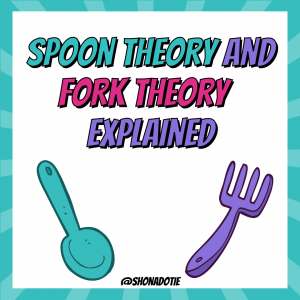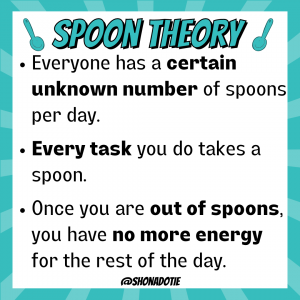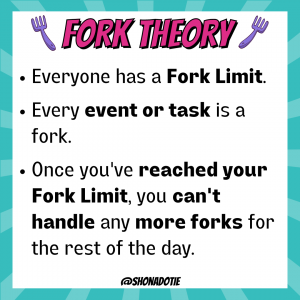 Being a parent can be tough, especially being a parent of a teenager. There are a lot of emotions, attitudes galore, and enough sass to rival Lizzo. But something we often hear parents say about their teenagers is “They are just so lazy.”
Being a parent can be tough, especially being a parent of a teenager. There are a lot of emotions, attitudes galore, and enough sass to rival Lizzo. But something we often hear parents say about their teenagers is “They are just so lazy.”
We’re not here to call you out (well we are just a little bit), but did you know that your teen could have much more going on, which is resulting in what you might see as laziness? We came across this really helpful explanation and it’s actually all about emotions and cutlery.
Now, before you start thinking we have lost the plot, bear with us, because this is going to make a lot of sense in a few minutes.
You might not think cutlery can become the basis of a life-changing way to view your teen’s emotions, but, surprise, it can! And not just one type of cutlery, but two. Let us introduce you all to our two favourite theories of emotion: spoon theory and fork theory.
Spoon theory was first imagined by Christine Miserandino to explain her experience with Lupus (chronic illness) to her best friend. Christine said that when you are healthy, you have endless possibilities for what you can do each day. When you are sick, those possibilities are more limited. She handed a bunch of spoons to her friend and told her that the spoons represent what you can do in a day. They are kind of like your energy level. You never know how many spoons you will have in a day, or how many things you might have to do each day, but every task (and she means every task) takes a spoon and once you are out of spoons, you are done. Finished. Donezo!
As the theory began to spread, people have used it more and more broadly! The more people who know about spoon theory and can talk about the number of spoons they have, the better the theory works as an explanation. Physical and mental illnesses, everyday stressors, individual days where you just feel terrible? All of them can be better understood with spoon theory.

So for example, is your daughter under a lot of pressure with schoolwork? Has she a big test or set of exams coming up? Is she maybe struggling to manage this stress? Then, does she have her everyday chores, tasks and non-academic commitments to fulfil as well? Chances are, she is struggling with burnout, and all of these stressors are taking her spoons, so she doesn’t have any left to make her bed, put away the washing or cut the grass.
Starting to make a little more sense now, huh? Hold on to hats, because here comes theory number 2!
Now, the fork theory is a little different and helps in a different way. It comes from the phrase “stick a fork in me, I’m done.” This is something you might say when someone adds yet another task to your already long to-do list. Well, the forks are also tasks (or events), but instead of being taken away, like spoons, they are added (or stabbed in). Forks can be all different sizes. Maybe responding to a text is a little fork and getting bad news about a family member is a big one. Same as spoon theory, every person has a certain number or volume of forks they can handle at a given moment (called the Fork Limit), and it changes from day to day. And once you’ve reached your limit, even the smallest additional fork can send you over the edge.

So, let’s look at another example. Have you ever asked your daughter to say help you put the shopping away, and all of a sudden you feel like you are doing the rounds with Katie Taylor (verbally of course), there is screaming, crying and lots of hand gestures? You are left totally stunned that she blew up at you like that. You might call her dramatic, give out to her for having a strop, or call her lazy!
However, we need to take a look at what is really going on and what she is currently dealing with. Again, are there stressors/pressure in school? Is there friendship drama? Is a big match coming up? Chances are, this blow-up was because she reached her Fork Limit, and she’s actually as confused as you are with how she reacted.
We really like the fork theory because it gives you a roadmap to managing your forks and avoiding surpassing your limit. Once you’ve decided how big each of your current forks is, you can take care of the smallest or simplest ones first and get them out of the way, leaving you with more energy to deal with the big ones.
The lesson at the end of the day is that there is a lot more beneath the surface than you can see, even if you spend a lot of time with someone. Your teen most likely isn’t lazy and is just struggling to manage their time and commitments. You don’t know how many forks and spoons they’ve had in a day, and how many they have left. A lot of times, they don’t even know themselves. The best thing to do when they’ve reached their limits is to believe them and let them do what they need to do to feel better.
So, why not have a chat with them about this theory, learn about what they are going through, and help them feel supported? Teenagers are amazing, but remember, they are still learning about how to survive this wild ride we call life. Why not give them a hand so they don’t have to learn things on their own?

If you’d like a little more support, check out Joanne Fortune’s SHINE Festival 2022 video – Communication 101: How To Ask For Help. Here she chats to us about how to start the conversation, asking for help when we need it, and how to approach tricky subjects with the people who love us.
If you would like to support us and the work that we do, you can find out more below




